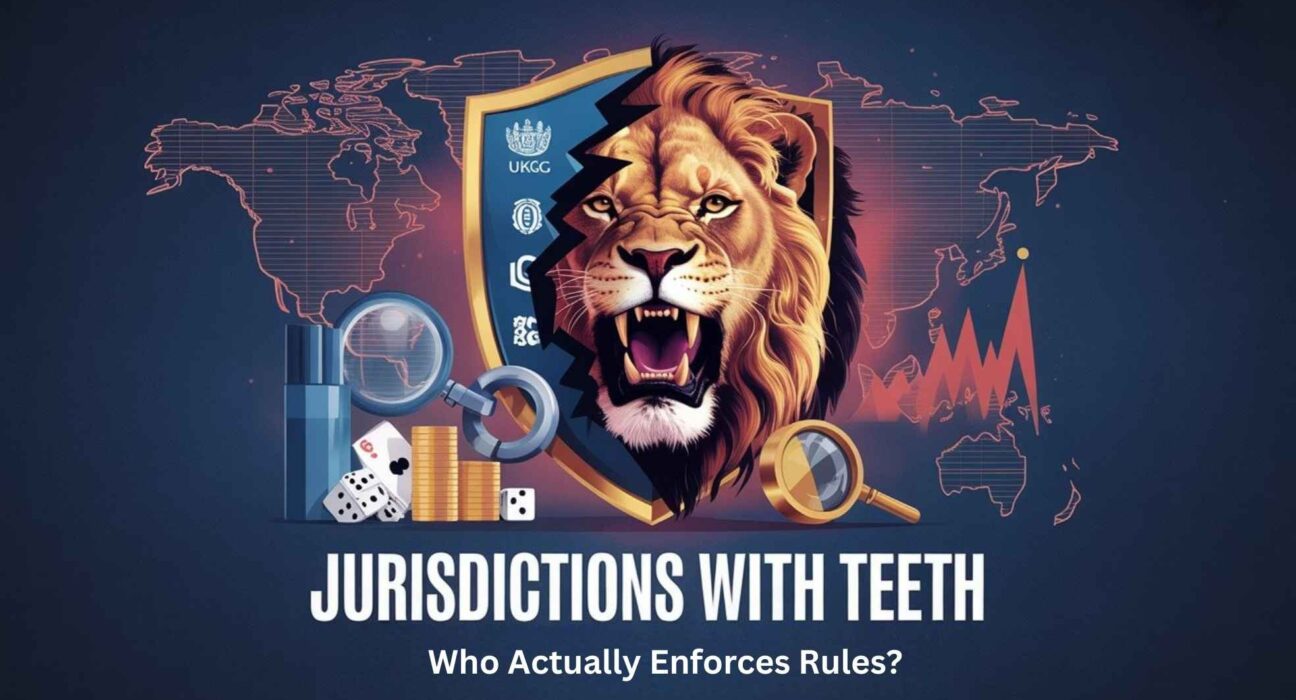In the ever-growing world of online gambling, the importance of regulatory compliance cannot be overstated. While some jurisdictions simply hand out licenses, others enforce rules with an iron fist. But who are the regulators that truly hold gambling operators accountable? Let’s explore the jurisdictions with the most robust enforcement policies, and see what makes them stand out in the world of iGaming regulation.
Introduction: Gambling Regulation and Enforcement
In the gambling industry, obtaining a license isn’t just about being allowed to operate; it’s about proving that an operator is committed to maintaining fairness, protecting players, and adhering to ethical standards. But not all regulatory bodies are created equal. Some jurisdictions are notorious for their lax standards, while others go above and beyond to ensure strict enforcement of gambling laws.
For operators, working within a jurisdiction that actively enforces rules is crucial not just for compliance but also for maintaining a positive reputation. For players, it guarantees that their funds are safe, games are fair, and their personal information is protected.
But which jurisdictions are known for enforcing their gambling regulations with teeth? Which authorities have the power and will to take action when rules are broken?
In this article, we’ll dive into the jurisdictions that don’t just hand out licenses but actively monitor, investigate, and penalize non-compliant operators. We’ll look at the regulatory authorities that stand out for their rigorous enforcement policies and examine how these jurisdictions balance the needs of operators with the protection of players.
1. United Kingdom Gambling Commission (UKGC): The Gold Standard in Enforcement
Overview of the UKGC
The UKGC is widely regarded as one of the most stringent and respected gambling regulators in the world. With a clear focus on player protection, fairness, and transparency, the UKGC enforces an extensive set of rules that operators must comply with in order to maintain their licenses. Its remit covers all forms of gambling within the UK, from online casinos to sports betting, lotteries, and more.
- Key Features of UKGC Enforcement:
- Audits & Monitoring: The UKGC conducts regular audits and monitoring of licensed operators to ensure compliance.
- Penalties & Fines: Non-compliance can result in hefty fines, license suspension, or even revocation.
- Responsible Gambling Mandates: Operators are required to implement strong measures to combat gambling addiction, including self-exclusion programs and responsible advertising guidelines.
- Transparency: UKGC enforces transparency in how operators handle player funds, including segregating player balances and offering clear information on the fairness of games.
Why the UKGC Has “Teeth”
- Active Enforcement: The UKGC is not afraid to take action. They have fined operators millions of pounds for breaches related to money laundering, unfair gaming practices, and player protection failures.
- Public Accountability: Fines and penalties are often made public, sending a strong message to the industry about the consequences of non-compliance.
- Proactive Approach: Rather than waiting for complaints, the UKGC actively investigates potential violations, ensuring that operators uphold high standards.
2. Malta Gaming Authority (MGA): Rigorous Oversight with a European Reach
Overview of the MGA
As one of the most trusted gambling authorities in Europe, the Malta Gaming Authority (MGA) offers a robust regulatory framework that prioritizes fairness, integrity, and player safety. While its regulatory environment is seen as favorable for operators, the MGA is also known for its diligent enforcement of rules.
- Key Features of MGA Enforcement:
- Licensing & Compliance Monitoring: The MGA requires operators to submit to rigorous background checks and continuous compliance reporting.
- Strict AML Regulations: The MGA enforces strict anti-money laundering (AML) regulations, ensuring that operators have appropriate procedures in place to detect and prevent financial crime.
- Game Fairness & Transparency: Regular audits ensure that games remain fair and that all advertised promotions are accurate.
- Player Protection Measures: Operators are required to implement safeguards such as age verification and responsible gambling tools.
Why the MGA Has “Teeth”
- Active Penalties: The MGA is not afraid to issue fines or revoke licenses for non-compliant operators. Recent cases have seen operators fined for failing to adhere to responsible gambling measures or improper AML procedures.
- Continuous Monitoring: The MGA keeps a watchful eye on operators, conducting regular audits and investigations to ensure ongoing compliance.
- Reputation Risk: Given its standing in the European Union, an MGA license carries significant weight, and losing it can damage an operator’s reputation in the international market.
3. United States (New Jersey Division of Gaming Enforcement, Pennsylvania Gaming Control Board): Local Enforcement with a National Impact
Overview of U.S. State Regulators
While the federal government does not regulate online gambling, individual states in the U.S. have taken matters into their own hands. New Jersey and Pennsylvania, two of the leading states in the iGaming market, have developed tough enforcement regimes to ensure that online gambling operators play by the rules.
- Key Features of U.S. State Regulators’ Enforcement:
- State-Specific Licensing: Operators must be licensed in each state in which they wish to operate, and they must comply with state-specific regulations.
- Active Investigations: Regulators like the New Jersey Division of Gaming Enforcement (NJDGE) and the Pennsylvania Gaming Control Board (PGCB) are known for conducting regular investigations into gambling operators’ activities.
- Fines and License Suspensions: Non-compliance can result in substantial fines, forced changes to business practices, or even suspension or revocation of licenses.
Why U.S. State Regulators Have “Teeth”
- Quick to Act: When operators violate state laws, regulators like NJDGE and PGCB are swift to impose penalties and enforce changes.
- Stringent Regulations: States like New Jersey have some of the toughest online gambling laws in the country, with strict consumer protection measures in place.
- Impact on Market Access: States such as New Jersey and Pennsylvania have large, lucrative gambling markets, and a revocation or suspension of a license can significantly affect an operator’s bottom line.
4. Gibraltar Regulatory Authority (GRA): The Watchdog of the Mediterranean
Overview of the Gibraltar Regulatory Authority
The Gibraltar Regulatory Authority (GRA) oversees gambling operations based in Gibraltar, one of the world’s most famous tax havens for the online gambling industry. Despite the perception of Gibraltar as a tax-friendly jurisdiction, the GRA is known for enforcing strict regulations that ensure fair play, consumer protection, and financial security.
- Key Features of GRA Enforcement:
- Robust Licensing: Operators must submit to extensive checks, and their financial health is scrutinized before a license is granted.
- Continuous Compliance Monitoring: The GRA continuously monitors operators for compliance with regulations surrounding game fairness, anti-money laundering, and responsible gambling.
- Penalties for Non-Compliance: Fines and other penalties can be levied for failing to meet regulatory standards.
Why the GRA Has “Teeth”
- Financial Security Requirements: The GRA requires operators to maintain a minimum level of financial security, ensuring that they have the resources to meet player claims.
- Active Penalties: The GRA is proactive in investigating complaints and violations. It has been known to issue large fines for operators who fail to meet its standards.
- Global Recognition: Gibraltar’s reputation as a leading licensing jurisdiction for gambling operators means that any violations or penalties have global repercussions.
5. Sweden (Spelinspektionen): Tough but Fair Enforcement
Overview of Spelinspektionen
Spelinspektionen, Sweden’s national gambling authority, has enforced some of the toughest gambling regulations in Europe since the country’s new gambling laws took effect in 2019. Sweden’s gambling market was liberalized, allowing international operators to apply for licenses, but they must adhere to strict consumer protection laws and ensure fairness.
- Key Features of Spelinspektionen Enforcement:
- Tough Licensing Requirements: Operators applying for licenses must meet strict criteria, including demonstrating that they offer secure payment methods and implement responsible gambling programs.
- Player Protection Measures: Spelinspektionen requires operators to offer tools for self-exclusion and to promote responsible gambling practices.
- Monitoring & Fines: The agency actively monitors operator activities and enforces penalties for non-compliance.
Why Spelinspektionen Has “Teeth”
- Heavy Penalties: Spelinspektionen has not hesitated to issue significant fines and penalties for breaches of its regulations. For example, operators who fail to protect vulnerable players face hefty fines.
- Strict Compliance Requirements: The authority’s strict rules on marketing, advertising, and consumer protection create a clear and consistent framework that operators must follow to stay licensed.
Conclusion: Which Jurisdictions Are Truly Enforcing the Rules?
When it comes to the enforcement of gambling regulations, certain jurisdictions stand head and shoulders above the rest. The UKGC, MGA, and U.S. state regulators like New Jersey and Pennsylvania have proven time and time again that they are committed to maintaining the integrity of the gambling industry. They not only issue licenses but actively monitor and enforce compliance, ensuring that operators are held accountable for their actions.
Other jurisdictions, such as Curaçao and some others, may offer less stringent enforcement, but for serious operators who are committed to compliance and player protection, the jurisdictions with teeth are the ones to consider. The cost of non-compliance can be severe, and regulators with real enforcement powers are the best safeguard for players, operators, and the overall industry.
In the world of iGaming, the old adage holds true—actions speak louder than words. Jurisdictions that back up their licenses with active enforcement are the ones that will continue to shape the future of the industry.











